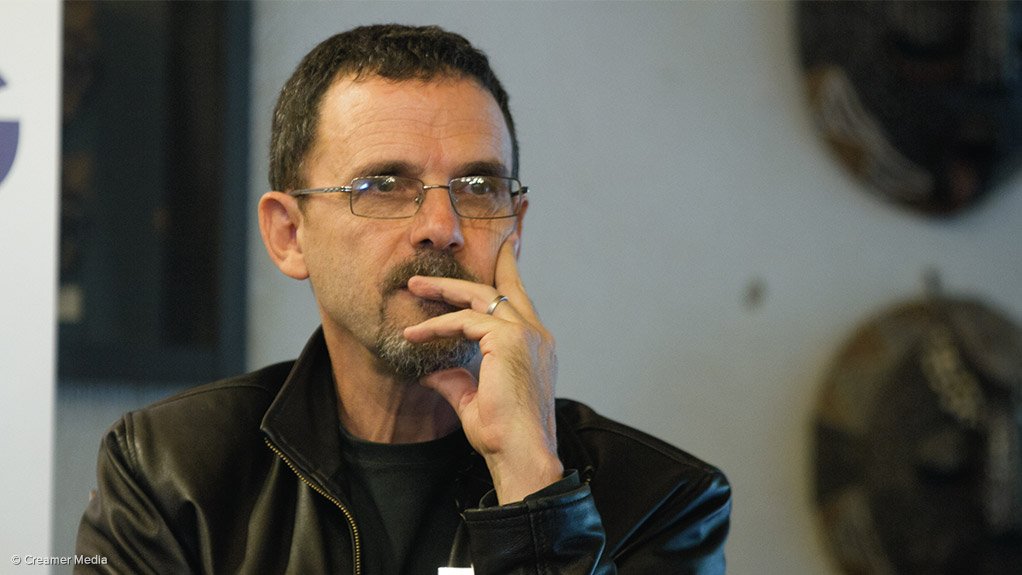Inequality top of mind as NDP debate series is launched



ADAM HABIB While there were many positive aspects to the National Development Plan, it had significant challenges, including inequality
NEIL COLEMAN The NDP reflects economic contestation in society, and the state and persistence of economic power relations embedded in key social institutions from the past
Photo by Duane Daws
The first of a series of 15 public debates exploring options for the implementation of the National Development Plan (NDP) was officially inaugurated at the University of the Witwatersrand (Wits) School of Governance last month.
In association with the Oliver and Adelaide Tambo Foundation, the Wits School of Governance hosted a panel of participants to stimulate discussions among stakeholders on the challenges of governance, policy and implementation, and the importance of building a capable State in South Africa.
National Planning Commission (NPC) Secretariat in the Presidency acting head Khulekani Mathe opened the debate, stating that the NDP called for greater collaboration between stakeholders to be successful, as acting in isolation would limit the impact of the NDP.
“To take South Africa forward, we need to discuss the problems and solutions. The NDP aims to address poverty, inequality and unemployment. We must note that the development is about the people and, if our initiative is not making an impact on people, then all we are doing will be incomplete,” he asserted.
He revealed that the Presidency would assess all the plans of the various national departments to ensure that what they put forward was aligned with the NDP. A unit would also be established to assess the impact of current and future policies and ensure that policies that went against the spirit of the NDP were not implemented.
The NPC continued to advise government on how to implement the NDP, engage with stakeholders and facilitate partnerships between stakeholders, Mathe said.
However, he put forward that the biggest challenge the NDP needed to address was inequality.
Wits vice-chancellor and principal Adam Habib agreed, noting that, while there were many positive aspects to the NDP, it had two significant challenges, including inequality.
“The NDP avoids the fundamental question of inequality in inclusive development. The NDP addresses poverty but the question is how to address inequality because it polarises society and creates relative depravation. The areas that have the most [violent] service delivery protests are not the poorest places. [These are] the places in the closest proximity to wealth,” he explained.
The dilemma of inequality, he stressed, was that, as employment increased and poverty was alleviated, the middle class would still grow faster than lower income earners.
Habib stated that this issue was avoided by government because “it is a difficult question to handle”, but warned that this approach did not help in dealing with inequality.
For the NDP to be successfully implemented, a pact and agreement were needed between different stakeholders in society, he suggested.
Further, a coherent plan from government was also required as there were many discrepancies within government in its approach to inequality.
Once coherence was established, coherence in society would be needed, as well as ongoing communication between the State, labour and business.
Congress of South African Trade Unions (Cosatu) strategist Neil Coleman noted that development plans around the world had been most successful where they had broad legitimacy and support and that the core of all institutionalised development planning had been the question of economic plans focused on industrial strategy.
“However, on both these fronts – securing broad social support and advancing coherent economic planning proposals – the NDP runs into problems. Cosatu recognised the plan was a mixed bag but we did not reject it in its totality. For a trade union federation, the critical issue was what its economic and labour market proposals were. As with other development plans, the core of the NDP rests on economic proposals.
“The NDP reflects economic contestation in society, and the state and persistence of economic power relations embedded in key social institutions from the past. We need to get to the root of structural problems in the economy and systematically address them, and the NDP fails to do this,” he stated.
There were positive elements of the plan but the economy impacted on all dimensions of the plan, he said, adding that the NDP, in relation to its economic and labour market analysis and proposals, failed to advance a radical economic shift and threatened to reverse certain progressive advances made over the last few years.
The NDP failed to take forward key progressive policies, including the need to fundamentally transform the economic structure and promote a new powerful growth for redistribution, Coleman said.
A massive push to industrialise the economy and the creation of decent work for all should be at the centre of economic policy.
Further, he suggested that redistribution be used as a fundamental pillar of economic development to combat economic inequality and poverty. The NDP does none of those, he asserted.
“The NDP’s job plan is problematic and unsustainable and is based on creating low-quality precarious jobs outside the core productive sectors of the economy. Secondly, it fails to pursue the Industrial Policy Action Plan and the New Growth Path vision of industrialising the economy.
“The NDP is premised on undermining worker rights and [is] a low-wage strategy, institutionalised through a two-tier labour market, which is centred particularly on repressing the wages of first-time workers,” Coleman argued.
He believed the NDP proposed a business- as-usual macroeconomic stance, which failed to address the inherited structural deficiencies of the South African economy or the domination of finance and mining capital and failed to propose the fundamental change of ownership that was needed to ensure the effective intervention by the State.
Meanwhile, mineral resource company Ichor Coal CEO Nonkululeko Nyembezi-Heita stated that the business sector was pleased with the NDP, as the plan recognised the role of business.
“The business sector remains supportive of the NDP and is keen for its implementation. There is enough in the NDP that we can begin to implement to move from where we are currently,” she said.
Comments
Press Office
Announcements
What's On
Subscribe to improve your user experience...
Option 1 (equivalent of R125 a month):
Receive a weekly copy of Creamer Media's Engineering News & Mining Weekly magazine
(print copy for those in South Africa and e-magazine for those outside of South Africa)
Receive daily email newsletters
Access to full search results
Access archive of magazine back copies
Access to Projects in Progress
Access to ONE Research Report of your choice in PDF format
Option 2 (equivalent of R375 a month):
All benefits from Option 1
PLUS
Access to Creamer Media's Research Channel Africa for ALL Research Reports, in PDF format, on various industrial and mining sectors
including Electricity; Water; Energy Transition; Hydrogen; Roads, Rail and Ports; Coal; Gold; Platinum; Battery Metals; etc.
Already a subscriber?
Forgotten your password?
Receive weekly copy of Creamer Media's Engineering News & Mining Weekly magazine (print copy for those in South Africa and e-magazine for those outside of South Africa)
➕
Recieve daily email newsletters
➕
Access to full search results
➕
Access archive of magazine back copies
➕
Access to Projects in Progress
➕
Access to ONE Research Report of your choice in PDF format
RESEARCH CHANNEL AFRICA
R4500 (equivalent of R375 a month)
SUBSCRIBEAll benefits from Option 1
➕
Access to Creamer Media's Research Channel Africa for ALL Research Reports on various industrial and mining sectors, in PDF format, including on:
Electricity
➕
Water
➕
Energy Transition
➕
Hydrogen
➕
Roads, Rail and Ports
➕
Coal
➕
Gold
➕
Platinum
➕
Battery Metals
➕
etc.
Receive all benefits from Option 1 or Option 2 delivered to numerous people at your company
➕
Multiple User names and Passwords for simultaneous log-ins
➕
Intranet integration access to all in your organisation




















